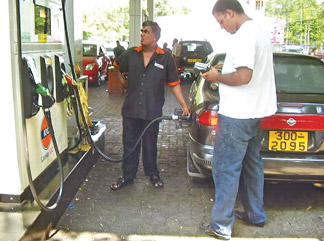Volatility of petrol and its performance
by L.S. Ananda WEDAARACHCHI
|

Cyril Suduwella
|
The Sunday Observer interviewed Cyril Suduwella, Msc, Diploma in
Petrochemistry, former Head of laboratory at Sapugaskanda Refinery and
eminent Petro Scientist with many years experience in petroleum testing
and quality of refined products. He held top posts in Sri Lankan and
overseas refineries dealing with all aspects of fossil fuels and
alternative fuels. He is also a visiting lecturer in Petroleum Chemistry
at Post Graduate Institute at Peradeniya University.
Excerpts of the interview:
Q: What is Petrol?
A: Petrol (Automotive Gasolines)
Automotive Gasoline or Petrol are essentially blends of hydrocarbons
derived from Petroleum. In addition, they may contain selected addives
that impart specific features to the finished gasoline. The Hydrocarbons
are derived from fractional distillation of Crude oil and from complex
process that increase either the amount or quality of the gasoline.
Gasolines contain hundreds of individual hydrocarbons which range from
normal butane to C12 hydrocarbons such as methyl naphthalene. The
properties of commercial petrol are predominantly influenced by the
refinery practices and partially by the nature of the crude oils from
which they are produced. Finished Petrol boils from 30 to 225 degrees
Celsius.
Gasoline are blended to satisfy diverse automotive requirements.
Antiknock rating (Octane Number), distillation characteristics, vapor
pressure, sulfer content, oxidation stability, and anti corrosive
behaviour are balanced to provide satisfactory vehicle performance.
Additives may be used to provide or enhance specific performance
features.
Q: What is Octane Number?
|

Petrol station |
A: The anti knock rating (Octane Number) of petrol is an
important characteristic. If antiknock rating is very low knock occurs.
Knock is a high pitch, metallic rapping noise. Petrol with antiknock
rating higher than that required for knock free operation does not
improve performance. However, vehicles equipped with knock limiters may
show a performance improvement as the antiknock quality of petrol is
increased; conversely antiknock rating decreases may cause vehicle
performance loss. The loss of power and the damage to an automotive
engine due to knocking are generally not significant until the knock
intensity becomes very severe. Heavy and prolonged knocking may cause
power loss and damage to the engine.
The Octane Number of petrol is measured by several methods. These
procedures employ single cylinder variable compression ratio single
cylinder laboratory engines. By definition, the octane number of
iso-octane is 100, and the octane number of n-heptane is zero. The
Octane number of a given Petrol is the percentage by volume of
iso-octane in a blend with n-heptane that knocks with the same intensity
at the same compression ratio as the Petrol, when compared by one of the
standardized engine test methods.
Q: Why does the quality of petrol depend on its volatility
properties?
A: The volatility properties of petrol are of prime importance
to the drivability of vehicles under all conditions encountered in
normal service. Petrol that vaporizes too readily in pumps, fuel lines,
and carburetors will cause decreased fuel flow to the engine, resulting
in rough engine operation or stoppage (vapor lock). Conversely, petrol
that do not vaporize readily enough may cause hard starting and poor
worm-up and acceleration, as well as unequal distribution of fuel to the
individual cylinders, which may cause knock.
Petrol that vaporises too readily also may cause, if certain
atmospheric conditions exist, ice formation in the carburetor throat,
resulting in rough idle and stalling.
The volatility of Petrol must be carefully "balanced" to provide the
optimum compromise among performance features that depend upon the
vaporisation behaviour. Superior performance in one respect may give
serious trouble in another, unless correct specifications are imposed.
Therefore, volatiilty characteristics of petrol must be adjusted for
seasonal variations in atmospheric temperatures and geographical
variation in altitude. The temperature at which 10%, 50% and 90%
evaporation occurs are used to characterise that volatility of Petrol.
Q: What are the other quality determining parameters?
A: In addition to the performance and volatility
characteristics, petrol must also provide for satisfactory engine
cleanliness. The following properties have a direct bearing on the
overall performance of Petrol;
* Workmanship and contamination
* Lead content
* Phosphorous content
* Manganese content
* Suulfur content
* Existent Gum and Oxidation stability
* Density or Specific Gravity
* Rust and Corrosion
* Hydrocarbon composition
* Additives
Q: What is water Tolerance?
A: Petrol and water are almost entirely immiscible; when
mixed, they readily separate into two phases. Blends will dissolve some
water but will also separate into two phases when contacted with more
water than they can dissolve. This was may be absorbed from ambient air
or may occur as liquid water in the bottom of tanks in the storage
distribution and vehicle fuel system. Such separation may not be a
problem with Petrol-Ether blends. However, it is a matter of concern
with Petrol-Alcohol blends because low molecular weight alcohols are
readily extracted from blends leaving an alcohol poor petrol phase and
an alcohol rich aqueous phase. This aqueous phase may be highly
corrosive many metals and the engine will not operate on it.
In addition, the properties of the petrol phase will differ from
those of the blend, for example, octane rating, volatility,
stoichiometry etc., and engine performance may suffer.
All plastics and elastomers used in current automotive fuel systems
such as gaskets, 'O"-rings, diaphragms, filters, seals etc., may be
affected in time by exposure to petrol. These effects include
dimensional changes, embrittlement, softening, delamination, increase in
permeability, loss of plasticizers, and disintegration. Petrol-Oxygenate
blends may aggravate these effects. |

